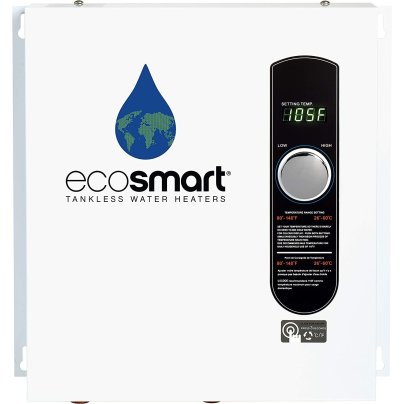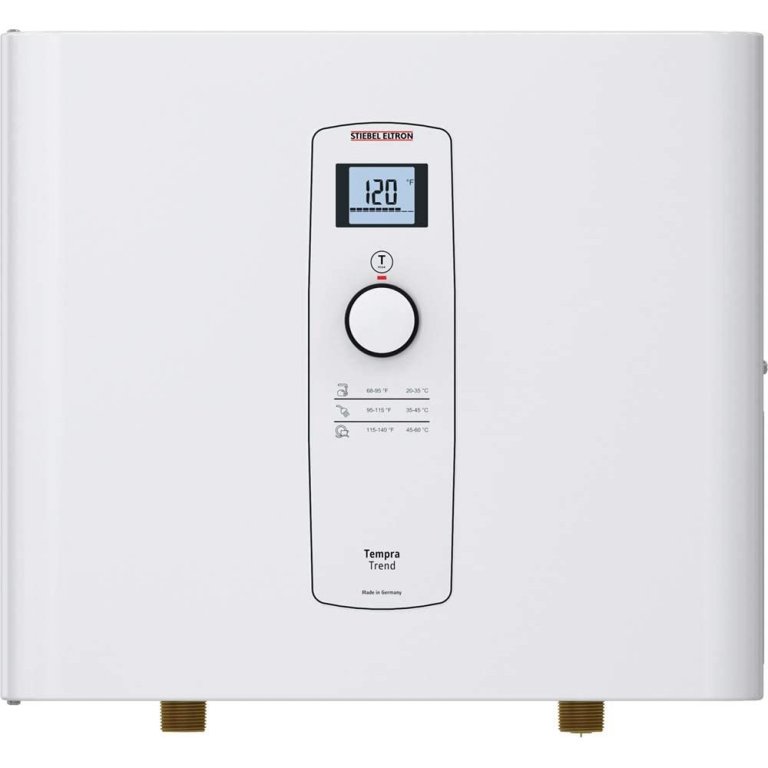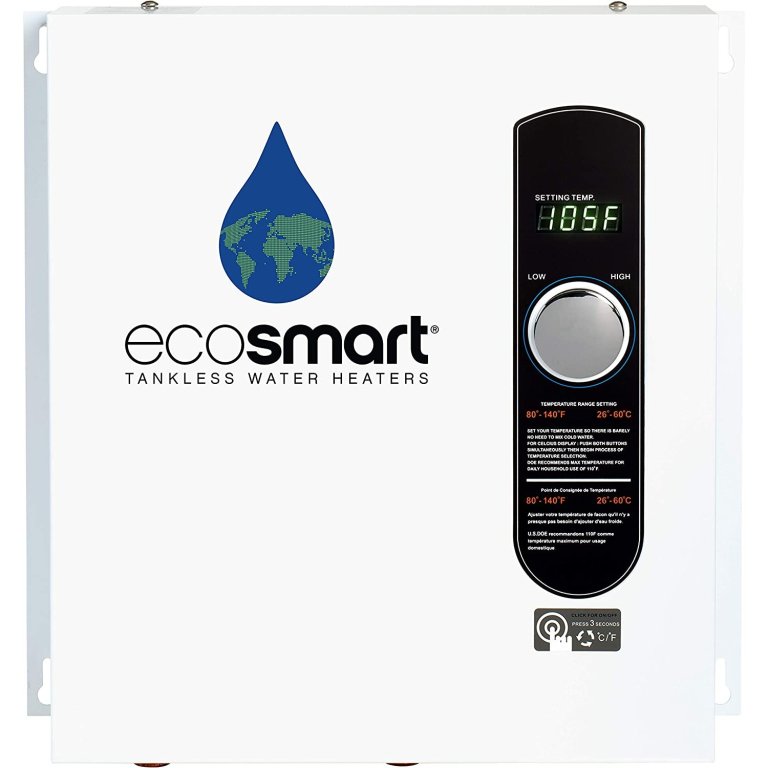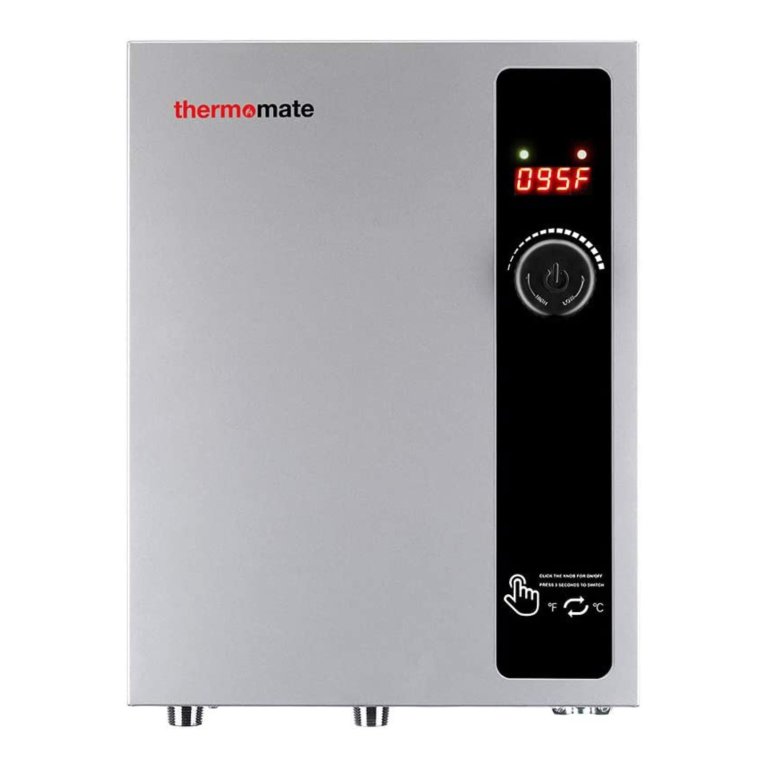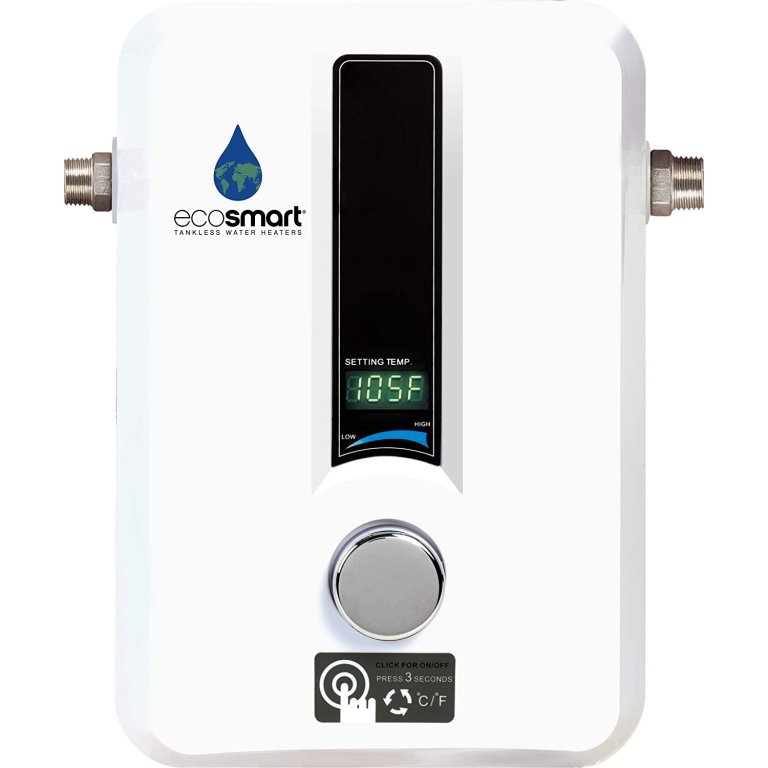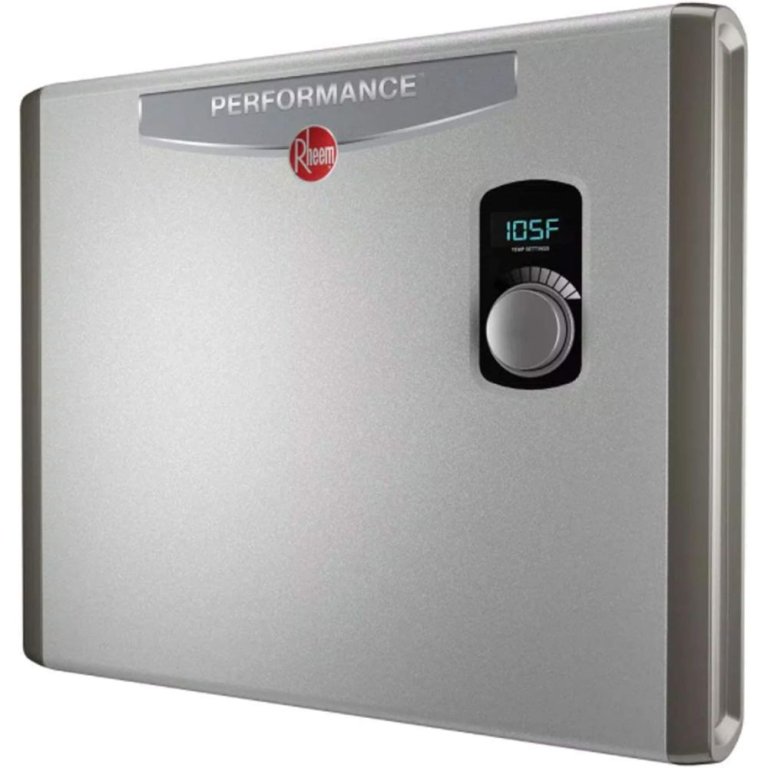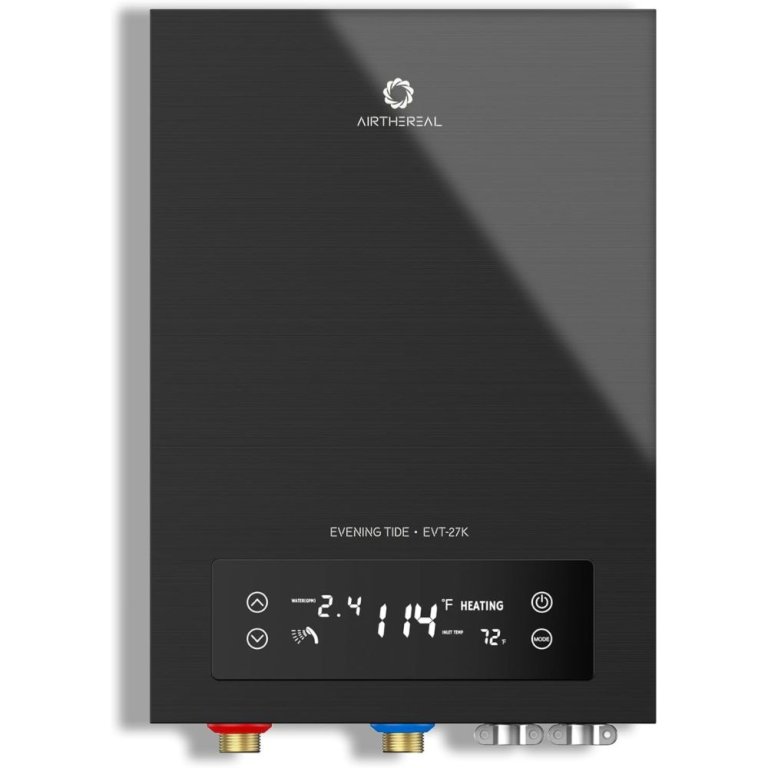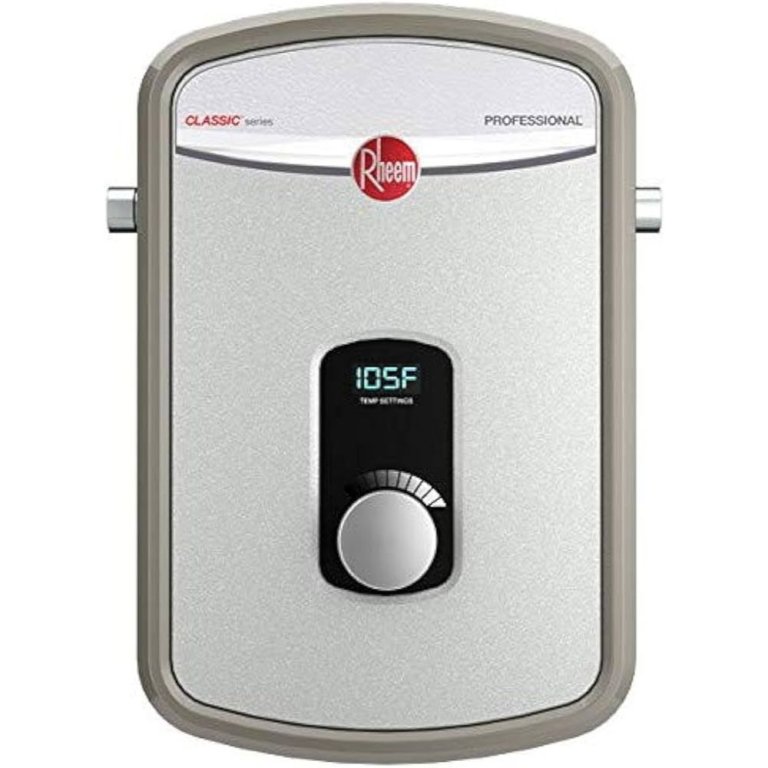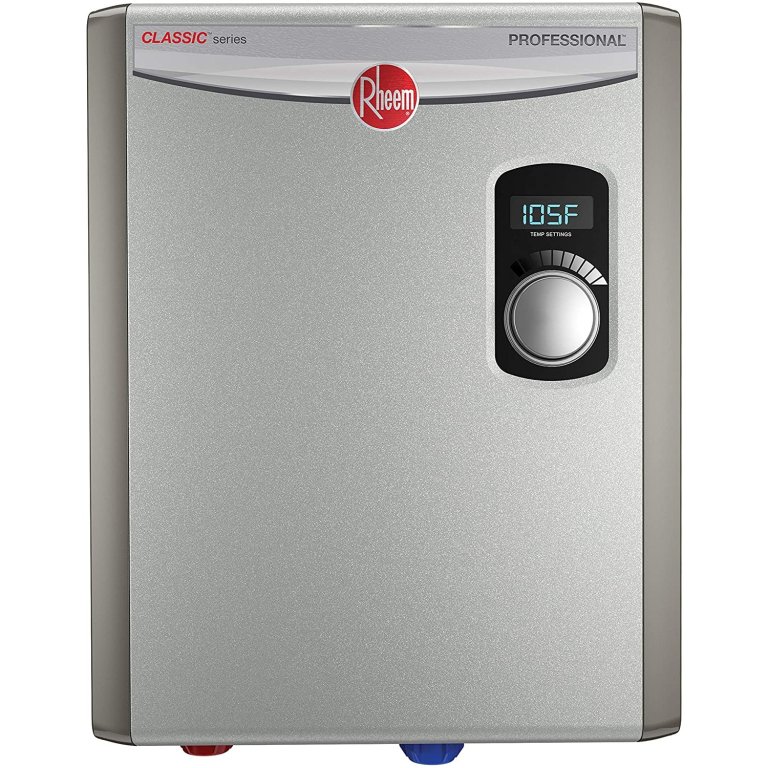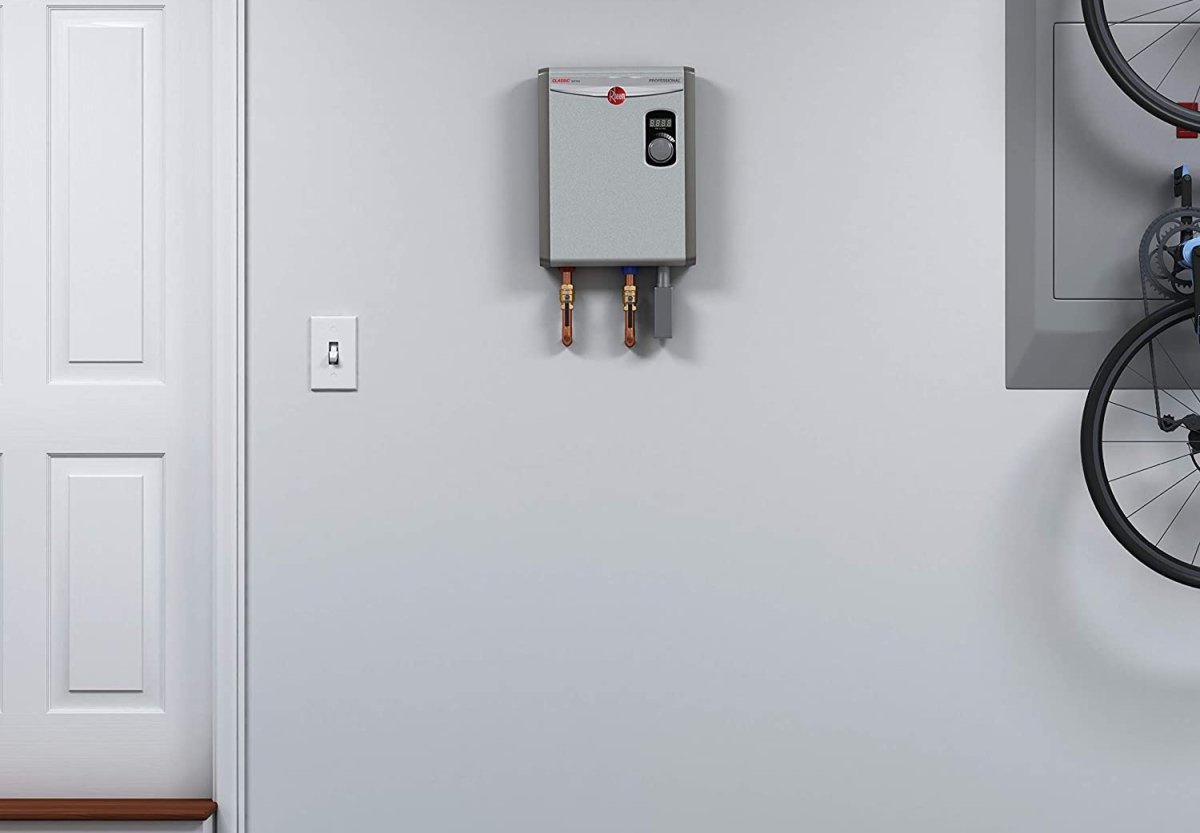
We may earn revenue from the products available on this page and participate in affiliate programs. Learn More ›
While traditional water heaters remain the best choice for some people, a tankless unit can save space and help reduce your monthly heating bills. This type of water heater provides hot water on demand, when it’s needed. Before switching, though, you’ll want to choose between buying a gas or electric model. High-end gas models are usually more powerful but also cost more and are more challenging to install.
Many homeowners prefer to avoid gas for safety reasons. Tankless gas water heaters typically aren’t as energy efficient as electric models, so that’s another reason to choose an electric tankless water heater.
We’ve used both types in various home remodels. Our best overall pick is the Stiebel Eltron Tempra 36 Trend Tankless Water Heater for its 7.5-GPM flow rate, 99 percent efficiency rating, and auto-modulation function.
To compile this list of the best electric tankless water heaters, we took an in-depth look at the products available and chose them by category based on specifications, features, and customer reviews.
- BEST OVERALL: Stiebel Eltron Tempra 36 Trend Tankless Water Heater
- RUNNER-UP: EcoSmart ECOS 27 Electric Tankless Water Heater
- BEST BANG FOR THE BUCK: Thermomate 18kW Tankless Electric Water Heater
- BEST FOR SMALL HOMES: EcoSmart ECO 11 Electric Tankless Water Heater
- BEST FOR LARGE HOMES: Rheem RETEX-36 Performance Tankless Heater
- MOST VERSATILE: Airthereal 27kW Electric Tankless Water Heater
- BEST FOR CONDOS: Rheem RTEX-13 Professional Classic Water Heater
- ALSO CONSIDER: Rheem RTEX-18 Professional Classic Water Heater
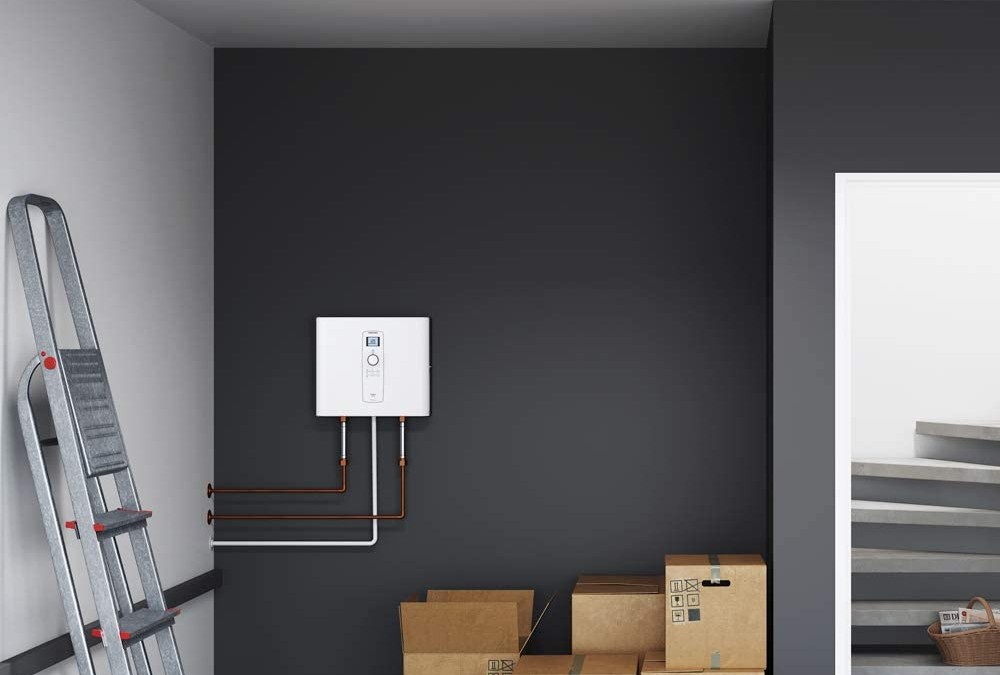
| Maximum Temperature | Maximum Flow Rate | Efficiency Rating | |
| Stiebel Eltron Tempra 36 Trend Tankless Water Heater | 140 degrees Fahrenheit | 7.5 GPM | 99 percent |
| EcoSmart ECOS 27 Electric Tankless Water Heater | 140 degrees Fahrenheit | 6.6 GPM | 94 percent |
| Thermomate 18kW Tankless Electric Water Heater | 140 degrees Fahrenheit | 4.5 GPM | 99.8 percent |
| EcoSmart ECO 11 Electric Tankless Water Heater | 140 degrees Fahrenheit | 3.1 GPM | 99.8 percent |
| Rheem RETEX-36 Performance Tankless Heater | 140 degrees Fahrenheit | 8 GPM | 99.8 percent |
| Airthereal 27kW Electric Tankless Water Heater | 114 degrees Fahrenheit | 5.5 GPM | N/A |
| Rheem RTEX-13 Professional Classic Water Heater | 140 degrees Fahrenheit | 3.17 GPM | 99.8 percent |
| Rheem RTEX-18 Professional Classic Water Heater | 140 degrees Fahrenheit | 4.4 GPM | 99.8 percent |
Our Top Picks
Our top picks come from a variety of leading manufacturers and have been divided into specific categories to make it simple to find the best electric tankless water heater for a particular household or situation.
Best Overall
Stiebel Eltron Tempra 36 Trend Tankless Water Heater
What We Like
- Equipped with auto-modulation that maximizes heating efficiency, helping to save energy costs
- Nearly silent operation provides enough hot water for 4 simultaneous showers
- Can serve large homes, with a high flow rate of 7.5 GPM
What We Don’t Like
- Some customers complain that the water heater has low water pressure
Product Specs
- Model: Tempra Trend 36
- Maximum temperature: 140 degrees Fahrenheit
- Maximum flow rate: 7.5 GPM
- Efficiency rating: 99 percent
The Stiebel Eltron Tempra 36 Trend is among the most powerful electric tankless water heaters on the market, providing a maximum of 7.5 GPM, which should provide enough hot water for four showers running simultaneously. It can heat water to 140 degrees Fahrenheit, well above the U.S. Department of Energy’s (DOE) maximum recommendation for household water temperature of 110 degrees Fahrenheit.
This model also is highly efficient. Given that no system is 100 percent perfect, a rating of 99 percent efficiency places the Stiebel Eltron among the best available. Auto-modulation minimizes temperature fluctuations, and the unit runs virtually silently. The preferred temperature can be preset into memory using the unit’s digital display.
This 36 kilowatt (kW) model requires a 240-volt (V) supply and three 50 amp (A) breakers. There are many Stiebel Eltron models in the Tempra range, offering high-quality solutions for installations of various types and sizes. The unit’s safety is recognized by UL and CSA certification.
Get the Stiebel Eltron electric tankless water heater at Amazon or The Home Depot.
Runner-Up
EcoSmart ECOS 27 Electric Tankless Water Heater
What We Like
- Auto-modulation features gives this water heater a high efficiency rating
- Minimal activation requirement of 0.3 GPM does not require full water pressure for heat
- Can serve larger homes with high maximum flow rate of 6.6 GPM
What We Don’t Like
- Some complaints about low build quality resulting in water leaking into the heat exchanger
Product Specs
- Model: ECOS 27
- Maximum temperature: 140 degrees Fahrenheit
- Maximum flow rate: 6.6 GPM
- Efficiency rating: 94 percent
The EcoSmart ECOS 27 electric tankless water heater is a compact unit that still offers competitive performance with a maximum of 6.6 GPM. It also has a minimal activation requirement of 0.3 GPM, so users don’t have to turn faucets on full power to get hot water. A less responsive electric water heater would waste water and electricity used for heating, but this one provides optimal control.
Like many other leading devices, this model uses flow modulation when heating water. This leads to optimal energy conservation while ensuring that changes in supply temperature or pressure have no impact on hot-water output. The maximum achievable temperature is 140 degrees Fahrenheit and its energy efficiency is 94 percent.
Running at 27kW, the EcoSmart ECOS 27 requires a 240V power supply and three 40A breakers. The device is both UL and CSA certified for safety.
Get the EcoSmart ECOS 27 electric tankless water heater at Amazon, Ace Hardware, or The Home Depot.
Best Bang for the Buck
Thermomate 18kW Tankless Electric Water Heater
What We Like
- Budget-friendly unit provides enough power for up to 3 applications
- Equipped with low-maintenance heating elements that are less likely to corrode than some
- Digital thermostat and dual controls make it easy to adjust temperatures
What We Don’t Like
- Modest flow rate might not meet demands of multibath homes
Product Specs
- Model: 18kW
- Maximum temperature: 140 degrees Fahrenheit
- Maximum flow rate: 4.5 GPM
- Efficiency rating: 99.8 percent
The budget-friendly 18 kW Thermomate tankless water heater is an economical solution designed to provide virtually instant hot water for up to three different applications. Despite the low cost, there’s still a digital thermostat adjustable in single-degree increments and self-modulated control for stable temperature output, plus maximum energy savings.
The heating elements run adjacent to the water supply rather than being immersed, reducing scale and corrosion for longer life. There is overheating protection, dry-heat protection in the event of interruption to the water supply, and the unit is Electric Testing Laboratories (ETL) certified for safety.
The Thermomate range also offers low-cost electric tankless water heaters at 11kW and 27kW, providing money-saving solutions for a variety of hot-water demands. This 18kW unit requires 240V and two 40A breakers. The model has a high 99.8 efficiency rating.
Get the Thermomate electric tankless water heater at Amazon or Thermomate.
Best for Smaller Homes
EcoSmart ECO 11 Electric Tankless Water Heater
What We Like
- Affordable unit that saves up to 50 percent on annual hot-water costs
- Highly efficient model provides simultaneous heat for a shower and low-flow sink
- Self-modulating technology provides stable temperature output while saving energy
What We Don’t Like
- Some complaints about warranty claims
Product Specs
- Model: ECO 11
- Maximum temperature: 140 degrees Fahrenheit
- Maximum flow rate: 3.1 GPM
- Efficiency rating: 99.8 percent
Those who live in compact modern homes will want to take a close look at the EcoSmart ECO 11. Rated for a maximum of 3.1 GPM, this affordable unit can provide constant hot water for a shower and low-flow faucet simultaneously. It is one of few electric tankless water heaters that uses the accurate Uniform Energy Factor (UEF) standard, with outstanding efficiency of 99.8 percent.
As with all the models in the EcoSmart range, the ECO 11 has self-modulating technology. The DOE estimates it saves around 50 percent on hot-water costs per year. The digital display provides temperature-control adjustment in 1-degree steps, anywhere from 80 to 140 degrees Fahrenheit. The EcoSmart ECO 11 is an 11.8kW device requiring 220V and a single 60A breaker.
Get the EcoSmart ECO 11 electric tankless water heater at Amazon or The Home Depot.
Best For Large Homes
Rheem RETEX-36 Performance Tankless Water Heater
What We Like
- Has a high flow rate of 8 GPM for serving multiple faucets and showers
- Can reach a high maximum temperature of 140 degrees Fahrenheit
- Self-modulates based on usage patterns to maximize energy savings
What We Don’t Like
- Takes up a lot of space in the electrical box with 4 double pole breakers
Product Specs
- Model: Performance RETEX-36
- Maximum temperature: 140 degrees Fahrenheit
- Maximum flow rate: 8 GPM
- Efficiency rating: 99.8 percent
With its high flow rate and max temperature, this 36kW model from one of the top brands in water heaters is a good option for larger homes. The Rheem tankless water heater can serve up to four showers and one faucet. Its thermostat has a top range of 140 degrees Fahrenheit and is adjustable in 1-degree increments from 80 to 140 degrees Fahrenheit. Temperature changes are easy to make thanks to a digital display and simple dial controls.
With its self-modulating technology, this Rheem tankless water heater will adjust the amount of energy it uses based on the home’s water consumption, helping to further save money. The Rheem 8 GPM tankless water heater takes up a fair amount of space in the electrical panel. With its high 36kW output, it requires a 240V power supply and uses four 40A double pole breakers.
Get the Rheem RETEX-36 electric tankless water heater at Amazon or The Home Depot.
Most Versatile
Airthereal 27kW Electric Tankless Water Heater
What We Like
- Comes in a broad range of sizes to suit homes both large and small
- Digital interface makes it easy to set the temperature and diagnose problems
- One of the more affordably priced tankless water heaters
What We Don’t Like
- Some customers complain that it doesn’t get water hot enough
Product Specs
- Model: 27kW
- Maximum temperature: 114 degrees Fahrenheit
- Maximum flow rate: 5.5 GPM
- Efficiency rating: N/A
Shoppers won’t have a problem finding that just-right-size tankless water heater for their home with the Airthereal series. That’s because it comes in five different sizes, ranging from 8kW to 27kW. It’s rated for a flow rate of between 2.5 GPM to 5.5 GPM, depending on the size of the unit, making it an option for homes ranging in size from a small condo to a 4-bedroom house.
A digital display allows the user to view the current temperature settings, quickly make temperature changes, and toggle between heating and standby mode. The display also shows error codes, making it easier to diagnose malfunctions. The 27kW Airthereal tankless water heater requires a 240V connection and three 40A circuit breakers, but the smaller 8kW needs only one 40A breaker.
Get the Airthereal electric tankless water heater at Amazon.
Best For Condos
Rheem RTEX-13 Professional Classic Water Heater
What We Like
- Compact size allows this electric heater to be installed in small spaces
- Easy-to-use dial controls and digital display thermostat
- Capable of reaching a high maximum temperature of 140 degrees Fahrenheit
What We Don’t Like
- Only produces enough hot water to serve 2 fixtures simultaneously
Product Specs
- Model: Professional Classic RTEX-13
- Maximum temperature: 140 degrees Fahrenheit
- Maximum flow rate: 3.17 GPM
- Efficiency rating: 99.8 percent
This smaller version of Rheem’s line of tankless hot water heaters is a great option for those looking to add the technology to a small home or condominium. With its maximum flow rate of 3.17 GPM, it can serve two fixtures simultaneously. And, at just 12.63 inches high by 8.25 inches wide, it’s compact enough to fit inside a closet or even a cabinet. It’s also capable of reaching a high maximum temperature of 140 degrees Fahrenheit.
With a digital temperature display and dial, the current thermostat settings and the ability to make quick changes come easily. As with the larger versions of this electric tankless water heater, this model is self-modulating, helping to save energy. This 13kW model uses a 240V power supply and requires a 60A breaker.
Get the Rheem RTEX-13 electric tankless water heater at The Home Depot.
Also Consider
Rheem RTEX-18 Professional Classic Water Heater
What We Like
- Easy-to-operate control dial with digital display
- Advanced self-modulation for 99.8 percent energy efficiency rating
- Brass-topped heating elements are durable yet easy to replace if needed
What We Don’t Like
- Some customers complain about poor build quality and durability
Product Specs
- Model: Professional Classic RTEX-18
- Maximum temperature: 140 degrees Fahrenheit
- Maximum flow rate: 4.4 GPM
- Efficiency rating: 99.8 percent
Rheem has tremendous experience with both gas and electric tankless water heaters. The high-quality RTEX-18 is rated for up to 4.4 GPM and offers advanced self-modulation, helping it achieve an efficiency rating of 99.8 percent. It can raise water temperature for one or two showers well beyond the recommended 110 degrees Fahrenheit level, making it an impressive yet economical choice for modest homes.
This model is widely recognized as being easy to install. Operation is simple, with a clear display and large dial offering control in single-degree increments. Brass-topped heating elements offer high durability and are easy to replace should the need arise. This Rheem model is an 18kW unit requiring a 240V supply and two 40A breakers.
Get the Rheem RTEX-18 electric tankless water heater at Amazon or The Home Depot.
Jump to Our Top Picks
How We Chose the Best Electric Tankless Water Heaters
We were particularly interested in major advancements in tankless water heater technology in recent years. Systems that respond precisely to demand are now even more efficient than early models. Durability seems to have improved as well. Most of today’s tankless electric water heaters have long life expectancies.
We researched the best electric tankless water heaters in a variety of categories and chose options with high customer satisfaction. We also enlisted help from Raymond Snesrud, founder and CEO of Minneapolis-based water heater installation company Water Heaters Now, to identify what factors matter most when choosing an electric tankless water heater. Examples of features we ultimately considered are maximum temperature, maximum flow rate, efficiency rating, and special features included by the top brands.
Most of the featured units offer water temperatures up to 140 degrees Fahrenheit. The selected water heaters range in flow rates between 1.5 and 7.5 gallons of water per minute (GPM) to accommodate the water needs of various households. Most units have an efficiency rating of 99 percent and above. Additionally, we prioritized water heaters with digital thermostats, durable metal components, and self-modulating technology. A few units are also Underwriters Laboratories (UL) and Canadian Standards Association (CSA) certified for reliable performance.
What to Consider When Choosing an Electric Tankless Water Heater
Shoppers looking to buy the best tankless water heater for their homes will want to know that the process of finding one involves more than just determining whether it will heat sufficient water. The type, flow rate, and other features play an important role, too. Here are several key issues that will likely influence decision-making.
Type
There are two main types of electric tankless water heaters: whole house or point of use (often referred to as POU or single point).
When considering replacing a traditional hot-water tank with an energy-saving electric tankless model, a whole-house solution is the most straightforward and doesn’t require additional plumbing. In new homes, or where guest accommodation has been added, point-of-use heaters might be the more economical answer. Although initial costs are a little higher, heating water close to where it’s needed means unused water doesn’t go cold sitting in long lengths of pipe, so less energy is wasted. However, there is no one-size-fits-all solution; each installation needs to be assessed individually.
Portability is a challenge because these devices are designed to be permanently wired—even for RV use. If a plug-in electric water heater is required, the best option is probably an electric mini-tank model.
Flow Rate (GPM)
With typical tank water heaters, how many gallons of water they hold can be a factor. But with electric tankless water heaters, how much hot water a unit can provide—or flow rate—is the most important factor to consider and is given in GPM.
The total number of showers, tubs, sinks, and washing machines inside a house helps the homeowner determine the water heater size needed. A 1- or 2-bath home typically needs around 5 GPM, while a 3- or 4-bath home needs a 10 GPM unit.
Water supply temperature impacts GPM, meaning a model fitted in the southern U.S. would provide a higher GPM than one fitted in northern states. Snesrud advises shoppers to look at a water heater’s temperature rise specs carefully; an electric tankless water heater’s flow rate can vary dramatically based on water supply temperature. “When a manufacturer says that a tankless can achieve 6 gallons per minute, do your math as that is always a max based on incoming water at 75 degrees [Fahrenheit],” he says. “The same unit when installed in Iowa (water supply temperatures are much lower) can only make 1.4 gallons a minute and can barely run a shower.”
Also, the GPM of electric tankless water heaters is often secondary to power (given in kW). This figure gives the energy used and the heat provided. Manufacturers usually offer guidance on their heaters concerning different levels of hot-water consumption. It’s a good idea to consult a qualified plumber or heating professional for further advice.
Efficiency Rating
A benefit of tankless water heaters is efficiency. They only heat water when needed, so very little energy is wasted, lowering utility bills. Electric tankless water heaters are typically more efficient than gas ones; the challenge is finding accurate ratings.
Gas models usually quote a UEF rating, a standard established by the DOE. Most manufacturers of electric models typically use the Energy Factor rating that preceded UEF, though, and this is no longer considered sufficiently accurate. There’s no suggestion that these are misleading, but given that each manufacturer might use different criteria for testing, this isn’t the most accurate way to compare models.
That said, a percentage efficiency is usually quoted instead. The efficiency of gas models ranges from 80 to 93 percent, while electric models are often 98 or 99 percent efficient. That’s good for the environment and for lowering household energy costs.
“As a general rule when it comes to heating water with electricity, a strong efficiency rating would be anything above an EF of 90,” Snesrud says.
Installation and Maintenance
Electric tankless water heaters are considerably easier to install than gas models because no venting is required. The devices are more compact and can be positioned just about anywhere that electricity and water can be provided.
While small and point-of-use models often run from a 120V supply, larger, more powerful models require 240V and usually two or three breakers. Snesrud says homeowners will also want to check their breaker box to see if they have enough available space for a tankless water heater.
“Most electric tanklesses need a considerable amount of power,” he says. “Kilowatts are the measuring stick here. For every kilowatt, multiply that number by four and that will tell you how many amps you need. Then a licensed electrician can tell you if you have enough room in your electric panel.”
DIYers with a thorough understanding of household electrical systems can tackle the work themselves, with no specialty tools required. Otherwise, they will want seek the help of a professional.
While these devices are largely trouble-free, a small amount of annual maintenance will keep them operating at peak performance, extending their working life. Most models have a screen filter to stop particles of dirt from entering the heater. This should be checked often for obstruction and cleaned if necessary. The system also needs to be flushed occasionally to prevent the buildup of chemical deposits.
Additional Features
Physical size is seldom a challenge with electric tankless water heaters. Water pipes and electrical conduits are small in diameter, so units are generally very compact and surprisingly slender. That said, dimensions might be important when installing point-of-use models.
Most are extremely quiet and don’t have the firing noise associated with gas models. Some manufacturers claim their heaters are completely silent.
These devices typically have some form of digital display. However, the controls and information provided vary considerably. Basic models might just have up-and-down arrows to increase or reduce power and a readout of the actual temperature. Others can have preset temperatures held in memory, provide adjustable flow control to reduce power consumption, or monitor and report energy savings.
FAQs
Our guide aims to address all questions and concerns shoppers have when they’re looking to buy a new electric tankless water heater. Sometimes questions can still crop up. Here are answers to some of the most common questions shoppers ask about buying the best electric tankless water heater for their homes.
Q. How does a tankless water heater work?
Turning on a faucet or shower activates the tankless water heater’s flow sensor, allowing the user to make the water hotter. It deactivates once the tap is closed.
Q. Do electric tankless water heaters need to be vented?
No. Unlike similar gas models, there is no carbon monoxide byproduct. Generally speaking, that makes electric tankless water heaters considerably easier to install.
Q. Can you still shower if your water heater is leaking?
Yes, but immediate professional repair or unit replacement is recommended to avoid minor to severe water damage.
Q. What are the signs your hot water heater is going out?
Dirty water, particularly if there are rust particles in it, is a sure sign of internal damage. Inconsistent performance and lack of response to temperature input are other indicators.
Q. How do you flush an electric tankless water heater?
Turn off the water and electrical supply, remove the heater element, fill the internal chambers with white vinegar, and then flush. Manufacturers usually provide instructions specific to each model.
Q. How long do electric tankless water heaters last?
A use life of 20 years or more can be expected according to the DOE.

